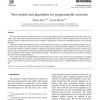Free Online Productivity Tools
i2Speak
i2Symbol
i2OCR
iTex2Img
iWeb2Print
iWeb2Shot
i2Type
iPdf2Split
iPdf2Merge
i2Bopomofo
i2Arabic
i2Style
i2Image
i2PDF
iLatex2Rtf
Sci2ools
122
click to vote
CN
2002
2002
New models and algorithms for programmable networks
In todays IP networks most of the network control and management tasks are performed at the end points. As a result, many important network functions cannot be optimized due to lack of sufficient support from the network. The growing need for quality guaranteed services brought on suggestions to add more computational power to the network elements. This paper studies the algorithmic power of networks whose routers are capable of performing complex tasks. It presents a new model that captures the hop-by-hop datagram forwarding mechanism deployed in todays IP networks, as well as the ability to perform complex computations in network elements as proposed in the active networks paradigm. Using our framework, we present and analyze distributed algorithms for basic problems that arise in the control and management of IP networks. These problems include: route discovery, message dissemination, multicast, topology discovery, and bottleneck detection. Our results prove that, although adding c...
Related Content
| Added | 17 Dec 2010 |
| Updated | 17 Dec 2010 |
| Type | Journal |
| Year | 2002 |
| Where | CN |
| Authors | Danny Raz, Yuval Shavitt |
Comments (0)

